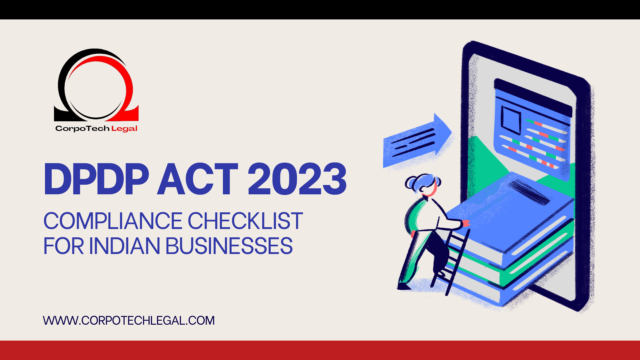Navigating the DPDP Act 2023: A Compliance Checklist for Indian Businesses
The Digital Personal Data Protection Act (DPDP Act) 2023 marks a significant milestone in India’s data privacy landscape. While it empowers individuals with control over their personal data, it also imposes significant obligations on businesses that collect, process, or store such data.
Navigating the DPDP Act can seem complex, but with a proactive approach and the right tools, achieving compliance is attainable. This checklist serves as a starting point for Indian businesses to assess their current practices and identify areas for improvement.

I. Key Concepts & Definitions:
- Data Principal: Any individual whose personal data is being processed.
- Data Fiduciary: Any entity or individual determining the purpose and means of processing personal data.
- Significant Data Fiduciary: A Significant Data Fiduciary (SDF) is a subcategory of Data Fiduciaries that handle high volumes of personal data or process sensitive data that poses greater risks to individual rights and freedoms.
- Personal Data: Any data relating to a living individual who can be identified, directly or indirectly.
- Sensitive Personal Data: Data revealing a person’s race, religion, caste, sexual orientation, health, etc.
- Data Protection Board (DPB): Regulatory body overseeing the implementation of the DPDP Act.
II. Core Compliance Steps:
1. Assess Data Processing Activities:
- Identify all personal data collected, processed, and stored by your business.
- Classify data as “personal” or “sensitive” according to the Act’s definitions.
- Determine the legal basis for processing each data category (e.g., consent, contract, etc.).
2. Implement Consent Management:
- Obtain freely given, specific, informed, and unambiguous consent for data processing.
- Use clear and easily understandable language in consent notices and forms.
- Offer a mechanism for individuals to easily withdraw consent.
3. Appoint a Data Protection Officer (DPO):
- Appoint a DPO, responsible for overseeing data protection compliance within the organization.
- Ensure the DPO has adequate resources and authority to fulfill their duties.
4. Secure Your Data:
- Implement appropriate technical and organizational measures to protect data from unauthorized access, use, disclosure, or alteration.
- Conduct regular data security audits and vulnerability assessments.
5. Address Data Subject Rights:
- Provide individuals with the right to access, rectify, restrict, transfer, and erase their personal data.
- Establish a clear and efficient process for handling data subject requests.
6. Prepare for Data Breaches:
- Develop a data breach response plan that includes notification to affected individuals and the DPB.
- Implement procedures for investigating and remediating data breaches.
7. Stay Informed & Update Policies:
- Regularly monitor developments related to the DPDP Act and its implementation.
- Update your privacy policy and other relevant documents to reflect compliance with the Act.
Impact of DPDP Act on the Privacy Policies and Cookie Policy of Websites Operating in India.
https://corpotechlegal.com/2024/07/12/dpdp-act-impact-on-privacy-policy-and-cookie-policy/
III. Additional Considerations:
- Data Minimization: Collect only the minimum data necessary for the identified purpose.
- Data Retention: Retain data only for as long as necessary and in accordance with the Act.
- Cross-border Data Transfers: Ensure compliance with the Act’s regulations for transferring personal data outside India.
IV. Seek Legal Guidance:
This checklist provides a general overview, and the specific requirements of the DPDP Act may vary depending on your business activities and data processing practices. Consulting with a legal professional with expertise in data privacy law is highly recommended to ensure comprehensive compliance.
By following these steps and seeking professional guidance, Indian businesses can navigate the DPDP Act with confidence and build trust with their customers.
Disclaimer: This article is intended for informational purposes only and does not constitute legal advice. Please consult with a qualified legal professional from CorpoTech Legal for advice specific to your situation.
Related Article :
Digital Personal Data Protection Act: Reshaping Corporate Data Practices
DEPA can be Backbone of Consent Management for DPDP Rules 2025
